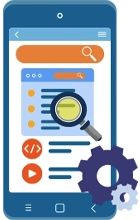What is Mobile App Testing?
Mobile app testing is the process of evaluating the functionality, performance, and usability of the mobile app across different operating systems (Android and iOS) and devices. It is a crucial process in the mobile app development stage to ensure that the mobile app delivers flawless performance under any circumstances.
During mobile app testing, it’s essential to test across different screen resolutions, devices, and network bandwidths. A quality-assured mobile app release not only ensures consistent user engagement but also has the potential to drive business growth.

Why Mobile App Testing is Important?
The objective of developing mobile apps is to generate revenue and enhance the business’s reputation. Users have a low tolerance for apps riddled with bugs and glitches, prompting them to un-install and seek alternatives on the Play Store or App Store. Consequently, your business reputation and revenues automatically decrease. The mobile testing process identifies the bugs deeply and ensures that the app is ready to be released for public usage.
Some key statistics to understand why mobile app testing is important,
- In the year of 2023 the Global smart phone users is 6.64 billion
- Totally, 230 billion mobile app downloads in 2023
- 80% of users delete or un-install apps with low quality and bugs
- 50% of users un-install apps with large storage requirements
- 48% of users abandon apps that are slow or unresponsive
Unlock the Power of TestWheel’s AI-Powered Mobile App Test Automation

Types of Mobile App’s
There are three fundamental types of mobile app’s
- Native App: The term itself expresses that apps are designed for specific operating systems using respective programming languages. For Android, Java is the programming language developers use to build the apps whereas, for iOS, swift or Kotlin is used to build the apps. The objective of building native apps is to accelerate the app performance and enhance the optimal user performance for the features intended.
- Hybrid App: Hybrid apps are developed for both native and mobile web applications. Programming languages like react native are generally used to develop hybrid apps. For businesses that target broader audiences, hybrid apps are the optimal choice to achieve that in the single code base.
- Mobile Web App: Mobile web apps are completely accessible through mobile web browsers. It does not require a platform like Play Store or App Store. The technologies involved in developing the application are HTML, CSS, and JavaScript. Anyone can access mobile web apps since it does not require any installation and is easily accessed through various devices.

Difference between Mobile app testing and Web app testing
While both web apps and mobile apps serve similar purposes – delivering functionalities to users – their environments and user interactions necessitate distinct testing approaches. Here’s a breakdown of the key differences.
| S.no | Testing Category | Web App Testing | Mobile App Testing |
|---|---|---|---|
| 1 | Platform & Devices | For web applications, the testing involves the web browsers and across diverse OS’s | For mobile applications, the testing involves Android and iOS mobile operating systems and evaluate with diverse screen sizes and resolutions |
| 2 | UI & Interaction | It involves testing with web applications navigation options, and other elements like buttons, text field, overall application architecture, and user accessibility | The testing involves interactions with touch-based interfaces, assessing the application’s user interface, and exploring multi-touch options. |
| 3 | Performance & Network | It evaluates the web application’s network connectivity when accessible through different browsers (Chrome, Safari, Edge) and its performance under different conditions | Network connectivity is crucial when it comes to mobile app testing (For varying bandwidth and signal strength). It involves evaluating the functionalities of data synchronizing and streaming |
| Testing Category | Web App Testing | Mobile App Testing |
|---|---|---|
| Platform & Devices | For web applications, the testing involves the web browsers and across diverse OS’s | For mobile applications, the testing involves Android and iOS mobile operating systems and evaluate with diverse screen sizes and resolutions |
| UI & Interaction | It involves testing with web applications navigation options, and other elements like buttons, text field, overall application architecture, and user accessibility | The testing involves interactions with touch-based interfaces, assessing the application’s user interface, and exploring multi-touch options. |
| Performance & Network | It evaluates the web application’s network connectivity when accessible through different browsers (Chrome, Safari, Edge) and its performance under different conditions | Network connectivity is crucial when it comes to mobile app testing (For varying bandwidth and signal strength). It involves evaluating the functionalities of data synchronizing and streaming |
Mobile App Automation Testing
Mobile app automation testing involves the test scripts or tools that automate the testing process for repetitive test cases. Manual or traditional testing is the methodology that requires human intervention to conduct the testing. In the case of manual testing, there is a possibility of human errors also the effort to conduct the test is immensely high. Resource utilization for this testing process is also high. Therefore, businesses are transforming into automation testing to enhance the productivity and reliability of an application.
Corporate businesses transforming into automation has many advantages as follows,
- Efficiency and Speed: The mobile app automation testing process provides a quicker response in test runs which helps to achieve consistent releases in agile and DevOps environments.
- Reusability Test Scripts:
Mobile app testing requires to be tested with the different versions of OS and devices. Leveraging automation testing testers could reuse the same test scripts for different conditions. It hugely reduces the manual effort and time. - Test Coverage:
Comprehensive test coverage is possible only in automation testing. Seamlessly test the various scenarios that take more time and examine the app thoroughly. - Regression Testing:There may be updates or new features in the existing development, Automation regression testing ensures that the existing application is not disturbed.
- Parallel Execution:
Automation tools enable the simultaneous execution of test cases on multiple devices and platforms. This parallel execution helps save time and ensures compatibility across a wide range of configurations.

Optimize your organization’s testing process with TestWheel to effectively drive growth
Mobile App Testing Services – TestWheel
Here are the few reasons why your businesses require mobile app testing services.
- Comprehensive Testing: Our testing tool is designed to offer tailored testing and provides a comprehensive testing report which helps the developer to take necessary actions. From functionality and compatibility to usability and performance, we rigorously test every aspect to deliver the highest quality results.
- Automation:With the advanced automation tools and frameworks our testing platform ensures the accuracy and efficacy of mobile app testing. TestWheel’s automated testing process saves time and resources, allowing us to test your app on multiple devices and platforms simultaneously.
- Cost-effective Solution:
Without compromising on the quality of testing, we provide competitive pricing and plans that are suitable for all sizes of businesses. Start testing your mobile app today with our easy sign-up process.

